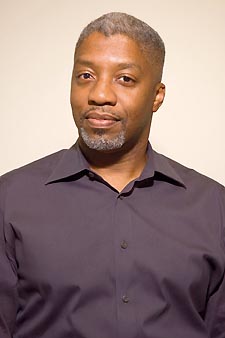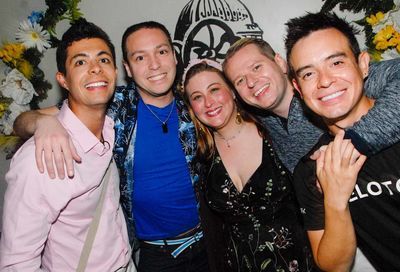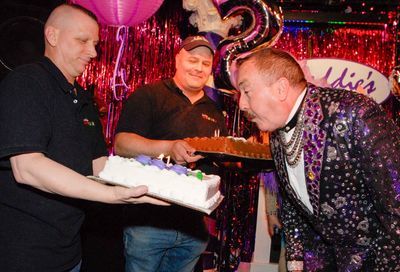Losing an Ally
Gay leaders mourn the death of Coretta Scott King, mull the future of the King legacy for GLBT civil rights
The Rev. Martin Luther King Jr., assassinated nearly 40 years ago, is a global icon for civil rights and social justice. In the years since his death, America has evolved from a place where King fought against the establishment, to a nation that officially recognizes his contributions with a federal holiday in his honor.
While the modern, American GLBT civil-rights movement had barely begun at the time of King’s death in 1968, that has not stopped debate on where the figure most synonymous with human rights in America might stand on the issue. His wife, Coretta Scott King, offered possibly the best-informed opinion.
”I still hear people say that I should not be talking about the rights of lesbian and gay people and I should stick to the issue of racial justice,” Mrs. King said in a 1998 speech, Reuters reported. ”But I hasten to remind them that Martin Luther King Jr. said ‘Injustice anywhere is a threat to justice everywhere.’… I appeal to everyone who believes in Martin Luther King Jr.’s dream to make room at the table of brother- and sisterhood for lesbian and gay people.”
 H. Alexander Robinson |
With the Jan. 30 death of Mrs. King, the GLBT community has lost one if its most esteemed allies, leaving open the question of the King legacy, as evidenced by her Feb. 7 funeral service at the New Birth Missionary Baptist Church in Atlanta. Her funeral drew a large crowd — including four U.S. presidents — to the church in which her daughter, Rev. Bernice King, is an elder. The church has a reputation for being hostile to gay civil-rights issues, as does Bernice King. Her cousin, Rev. Alveda King, has also been outspoken, insisting Martin Luther King Jr. would not have supported same-sex marriage. The choice of the church was enough to keep Julian Bond, chairman of the National Association for the Advancement of Colored People (NAACP), from attending. The Cavalier Daily, independent newspaper of the University of Virginia, where Bond is a history professor, reported that Bond sent an e-mail to one student explaining why he chose not to attend:
”Mrs. King was a strong supporter of gay and lesbian rights,” he wrote, in part. ”The pastor of the church [Bishop Eddie Long] where she was funeralized led an anti-gay march through Atlanta — sadly, Mrs. King’s youngest daughter, an elder in his church, accompanied him. We cannot know what Mrs. King’s wishes were for a funeral — she probably had no choice about church or minister — but I did have a choice — and while I have an abiding respect for my former neighbor and friend, I chose not to be in that church.”
Three leaders of the GLBT civil-rights movement were in attendance, however: Matt Foreman, of the National Gay & Lesbian Task Force; H. Alexander Robinson of the National Black Justice Coalition; and Joe Solmonese of the Human Rights Campaign — all heads of their respective organizations.
”I had deep reservations, but I would’ve gone anywhere to be at her funeral,” says Foreman. ”She was so important to gay people. She was such a friend and such an ally when there was nothing in it for her. I would’ve gone anywhere.”
Solmonese points out that there may have been practical concerns in choosing the venue, as New Birth could accommodate a much larger audience than Mrs. King’s own Ebenezer Baptist Church, where a smaller service was held Feb. 6.
Robinson says that the choice of New Birth was actually a fitting testament to Mrs. King’s ability to bridge communities. ”It was prophetic that a woman who lived her life dedicated to her husband’s vision of an inclusive society would in death bring together a group of people who have such diverse opinions and ideologies,” he says. ”It spoke to who she was.”
Beyond the venue, the funeral service caused controversy in that some speakers touched on issues of social justice and government oppression, that were perceived by some to inappropriately inject politics into the funeral service. Rev. Joseph Lowery, former president of the Southern Christian Leadership Conference, cited Mrs. King’s anti-war sentiments, saying, ”Coretta…knew there were no weapons of mass destruction over there, but there were weapons of misdirection right down here.” Carter pointed to the victims of Hurricane Katrina, as well as ”secret government wiretapping,” employed against the King family in years past — and seen by some as a jab at the current administration’s questionable use of domestic surveillance.
Robinson says he found the remarks perfectly appropriate for the occasion. ”Whose funeral was it?” he asks. ”It was the funeral of a woman who had dedicated her life to social justice. I believe [the remarks] were very consistent with the life she led. The protest of ‘politicization’ came from people who disagreed with the social-justice message. The messages of justice, non-violent resistance, were all messages she put forth in her life.”
Foreman and Solmonese agree.
”I don’t think [the remarks] were inappropriate at all,” says Solmonese. ”And I don’t think the speakers were intentionally taking shots at the president. They were speaking to Coretta Scott King’s life work. If that made George Bush uncomfortable, that’s George Bush’s problem.”
Adds Foreman: ”It was totally in keeping with her spirit. If there was anything inappropriate, it was that President Bush — who has done everything possible to destroy the King legacy — was there and speaking.”
What may be of greater concern than who said what at Mrs. King’s funeral service, is who will claim to speak for Martin Luther King Jr. in the future. Differing voices are filling the void. While Bernice King is joined by her cousin, Alveda King, in staking claim to a King legacy hostile to gay people, the family’s elder daughter, Yolanda King, has been supportive of gay equality. Martin Luther King III has said his father would likely have been a supporter of GLBT equality.
Regardless of whose voices will become the King legacy of the future, there is no question that the gay community has lost an irreplaceable ally.
”She was a huge ally,” says Solmonese. ”She lent her name to the cause, testified before Congress on ENDA (Employment Non-Discrimination Act), appeared at events. I hope that her death will lead to a rededication and a re-focusing on her and Dr. King’s lives. That’s the message I took from her funeral.”
Says Foreman: ”She was one of those people that when you were in her presence, you knew that you were with someone who was — I’m a little hesitant to use this word — holy. She just radiated intense integrity, goodness and determination. I think we’ve lost the best straight ally we’ve ever had, because she was able to speak with such moral authority on our behalf. Of course we’re going to go on. Part of life is death. We were incredibly fortunate to have her for the decades we did.”
Robinson also strikes an optimistic chord.
”Certainly not having her presence, not having her around as an advocate, is a great loss. But her message is not lost,” he concludes. ”She lived her life in a way that we’re able to draw from her example and continue to achieve her vision. I feel that she is very much present. We certainly will miss her being an active advocate, but we can draw strength from her contributions, and her record of integrity and consistency. In her passing, we reflect even more on what she stood for.”
Advertisement
|
Support Metro Weekly’s Journalism
These are challenging times for news organizations. And yet it’s crucial we stay active and provide vital resources and information to both our local readers and the world. So won’t you please take a moment and consider supporting Metro Weekly with a membership? For as little as $5 a month, you can help ensure Metro Weekly magazine and MetroWeekly.com remain free, viable resources as we provide the best, most diverse, culturally-resonant LGBTQ coverage in both the D.C. region and around the world. Memberships come with exclusive perks and discounts, your own personal digital delivery of each week’s magazine (and an archive), access to our Member's Lounge when it launches this fall, and exclusive members-only items like Metro Weekly Membership Mugs and Tote Bags! Check out all our membership levels here and please join us today!






















